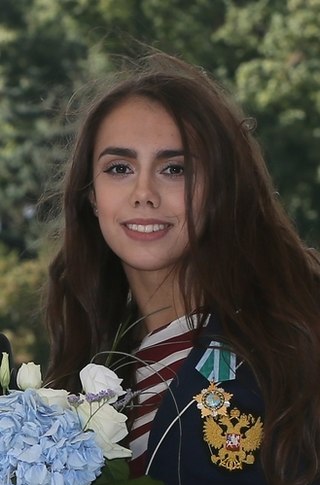
Melitina Dmitryevna Staniouta is a Belarusian retired individual rhythmic gymnast. She is a three-time World all-around bronze medalist, the 2015 European Games all-around bronze medalist, the 2014 European Championships all-around silver medalist, and 2009 Grand Prix Final all-around bronze medalist.

Neta Rivkin is a retired Israeli individual rhythmic gymnast.

Jana Berezko-Marggrander is a German retired individual rhythmic gymnast. She is the 2010 Youth Olympic all-around bronze medalist.

Margarita Mamun is a retired Russian individual rhythmic gymnast of Bangladeshi-Russian descent. She is the 2016 Olympic All-around champion, two-time World All-around silver medalist, the 2015 European Games All-around silver medalist, the 2016 European Championships All-around silver medalist, three-time Grand Prix Final All-around champion and a three-time (2011–2013) Russian National All-around champion.
The Rhythmic Gymnastics World Cup is a competition for rhythmic gymnastics sanctioned by the Fédération Internationale de Gymnastique (FIG). It is one of the few tournaments in rhythmic gymnastics officially organized by FIG, as well as the World Championships, the gymnastics competitions at the Olympic Games and the Youth Olympics, and the rhythmic gymnastics events at the World Games. The World Cup series should not be confused with the Rhythmic Gymnastics Grand Prix series, which is neither officially organized nor promoted by FIG.
The Rhythmic Gymnastics Grand Prix circuit is an annual competition of tournaments in rhythmic gymnastics open to gymnasts from all over the globe. The series consists of a number of stages in different countries in Europe. The Grand Prix circuit usually hosts some of the most watched yearly events in rhythmic gymnastics, frequently gathering some of the best gymnasts in the world. Each Grand Prix stage is held as an all-around qualification competition, followed by four apparatus finals with hoop, ball, clubs and ribbon. The final event in the circuit is commonly referred to as Grand Prix Final. The focus in each stage is on individual performances, though groups have also been allowed to compete in some stages since, at least, 1995. The Grand Prix circuit should not be confused with the Rhythmic Gymnastics World Cup series, which is a competition officially organized by the Fédération Internationale de Gymnastique (FIG), whereas the Grand Prix is neither organized nor promoted by FIG.
Salome Pazhava is a former Georgian individual rhythmic gymnast. She is Georgia's most successful rhythmic gymnast after Irina Gabashvili. She finished 4th in All-around at the 2015 World Championships.

Laura Jung is a German retired individual rhythmic gymnast.
The 2009 FIG World Cup circuit in Rhythmic Gymnastics includes six category A events and two category B events. With stopovers in Europe only, the competitions took place on March 6–8 in Budapest (HUN), April 4–5 in Saint Petersburg (RUS), April 16–19 in Portimão (POR), April 25–26 in Maribor (SLO), April 30 – May 2 in Pesaro (ITA), May 8–10 in Corbeil-Essonnes (FRA), August 15–17 in Kyiv (UKR) and August 21–23 in Minsk (BLR). Two events were open only to individual athletes, while six were open to both individual athletes and groups. In all of the events, all-around competitions served as qualifications for the finals by apparatus. The world ranking points collected by the competitors at their best four World Cup events added up to a total, and the top scorers in each event were crowned winners of the overall series at the final event in Minsk, Belarus.
The 2007–2008 FIG Rhythmic Gymnastics World Cup series was a series of stages where events in rhythmic gymnastics were contested. The series consisted of a two-year long competition, culminating at a final event — the World Cup Final in 2008. A number of qualifier stages were held. The top 3 gymnasts and groups in each apparatus at the qualifier events would receive medals and prize money. The organizing committees were free to host all-around competitions, but these were not eligible for the assignment of World Cup points. Gymnasts and groups that finished in the top 8 also received points which were added up to a ranking that qualified for the biennial World Cup Final.
The 2005–2006 FIG Rhythmic Gymnastics World Cup series was a series of stages where events in rhythmic gymnastics were contested. The series consisted of a two-year long competition, culminating at a final event — the World Cup Final in 2008. A number of qualifier stages were held. The top 3 gymnasts and groups in each apparatus at the qualifier events would receive medals and prize money. The organizing committees were free to host all-around competitions, but these events were not eligible for the assignment of World Cup points. Gymnasts and groups that finished in the top 8 also received points which were added up to a ranking that qualified for the biennial World Cup Final.
The 1999–2000 FIG Rhythmic Gymnastics World Cup series was a series of stages where events in rhythmic gymnastics were contested. The series consisted of a two-year long competition, culminating at a final event — the World Cup Final in 2000. A number of qualifier stages were held. The top 3 gymnasts in each apparatus at the qualifier events would receive medals and prize money. Gymnasts that finished in the top 8 also received points which were added up to a ranking that qualified for the biennial World Cup Final.
The 1996 Rhythmic Gymnastics Grand Prix circuit was a series of competitions in rhythmic gymnastics.
The 1999 Rhythmic Gymnastics Grand Prix circuit was a series of competitions in rhythmic gymnastics.
The 2000 Rhythmic Gymnastics Grand Prix circuit was a series of competitions in rhythmic gymnastics.
The 1998 Rhythmic Gymnastics Grand Prix circuit was a series of competitions in rhythmic gymnastics.
The 2003 Rhythmic Gymnastics Grand Prix circuit was a series of competitions in rhythmic gymnastics.
The 2005 Rhythmic Gymnastics Grand Prix circuit was a series of competitions in rhythmic gymnastics.




